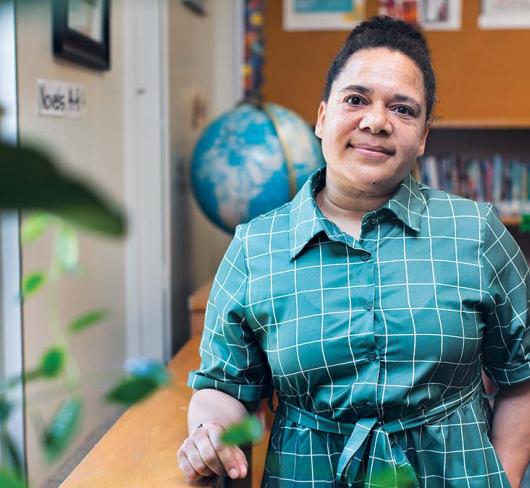
Doug Ford and His Conservative Government: Consulting But Not Listening
The day after Doug Ford shuffled his cabinet, the outgoing Minister of Education posted a farewell message on her twitter account, in part touting the “largest consultation” in the Ministry of Education’s history. What followed was, perhaps predictably, a barrage of responses from parents, teachers and other educators delivering a dose of reality as only social media can. People who have been paying attention to the damage the Conservative government has imposed on public education this past year pointed out the significant distance between the Minister’s rhetoric and reality.
In a post-truth era, where politics is dominated by one-line slogans and superlatives, the Ford government has sought to justify its austerity agenda by telling Ontarians it is what “the people” want. With that phrase, repeated on every media release, the government has sought to pass its drastic changes to public programs as simply delivering what people have asked for.
Never mind that the Progressive Conservatives under Doug Ford ran on virtually no platform, or the fact that since taking office the government’s cuts have been met with widespread opposition and, in some cases, they were forced to retreat, amend or withdraw.
Over the past year, we have seen an unprecedented number of public consultations in the education sector. They asked the public to tell them whether cell phones have a place in the classroom, whether children should be taught about consent and whether public sector employees should have their compensation frozen.
There is nothing wrong with a government consulting the public; the problem arises when those consultations are nothing more than window dressing. The Ford government has indeed engaged in massive public consultations. What it hasn’t done is listen to the tens of thousands of Ontarians who have expressed concern, disagreement and opposition to the government’s plans. It has disregarded the voices of “the people” it purports to represent, along with the important voices of researchers and experts in the field.
Consultations are this government’s way of justifying a legislative agenda that is not based on an election platform or a plan articulated in public discourse.
Education Consultations
In the fall of 2018, the government launched its first round of education consultations. The consultations sough feedback primarily from parents, although eventually it was broadened to include stakeholders and the public, on a range of topics. The government asked for input on how to improve student performance in STEM, how to better prepare students for the skilled trades and how to include coding in the curriculum. It sought feedback on improving standardized testing, ensuring students learn additional life skills including financial literacy and managing cell phone use in the classroom. Finally, the government asked what parents wanted to see in a new health and physical education curriculum and what they thought about developing a Parents’ Bill of Rights.
The response to these consultations was overwhelming. On the first day of the consultations the government received approximately 1,600 submissions, the vast majority of them calling for the reinstatement of the 2015 Health and Physical Education Curriculum, which the government had replaced with the 1998 version at the beginning of their term. When this was reported by the media, the Premier dismissed it as “certain groups” seeking to skew the results. This has become the standard response from the current government, dismiss those who don’t agree by saying they have been manipulated by someone else, and hence their opinions are illegitimate.
ETFO participated in the consultation process in good faith and with sound arguments. It encouraged members to make submissions, participate in the telephone townhalls and respond to the online survey. ETFO members responded positively and in numbers, and made their views clearly known. ETFO prepared a submission to the government with evidence-based arguments to support policy recommendations.
In the end, the government declared the consultations a success and swiftly moved forward with their pre-determined plans. Ignoring the demand for evidence-based decision making, it simply announced a cell-phone ban – which they had previously announced during the election campaign – and moved on to the next stage of education reforms.
Class Size and Full-Day Kindergarten
In late January, the government announced two new rounds of consultations with stakeholders in the education sector. The first was related to class size, which included questions on Full-Day Kindergarten (FDK), and the second was on hiring practices in Ontario school boards. From the beginning of this process, the government was intent on increasing class sizes through the entire public education system. The government also made it clear it was considering removing the hard caps on class size currently in place in for Kindergarten and grades 1-3, changing the current teacher/DECE model for FDK and increasing class size averages by up to 6 students.
ETFO responded by mobilizing members and the public to ensure that a strong message was sent back to the government, the Ministry of Education and local MPPs. An online tool was set up on BuildingBetterSchools.ca that allowed parents, teachers and other educators, and the public to contact their MPPs and send a message advocating for smaller classes and defending the current hard caps on class size in Kindergarten and grades 1-3. More than 100,000 people sent an email to their MPP opposing larger classes and many also called their MPP. That is 30,000 more than participated in the government’s consultation.
The overwhelming response from the public forced the government to backtrack on part of its agenda. When then Minister of Education, Hon. Lisa Thompson, announced planned changes to average class size on the last day of March break, she credited ETFO’s campaign for the government’s decision to maintain the hard caps on class size for Kindergarten and grades 1-3. This was only a partial victory for elementary educators as the average class size in grades 4-8 will increase by 1, but a victory nonetheless. ETFO has consistently demonstrated that our organizing works.
Hiring Practices and Regulations 274 Consultation
Regulation 274/12 (Regulation 274) sets out a clear, consistent and transparent process for the consideration of candidates for vacant positions. Under the regulation, school boards must maintain both a roster of occasional teachers (OT) and a long-term occasional teachers’ list (LTO list).
Regulation 274 ensures that only teachers with the required experience and qualifications are considered for permanent positions. It also provides clarity and predictability to current OTs as well as those considering entering the teaching profession on what to expect from the hiring process. Regulation 274 has gone a long way to eliminating nepotism and favouritism from the hiring process at Ontario school boards.
From the moment the government launched its consultation on hiring practices, it was obvious they were looking to weaken and perhaps entirely dismantle Regulation 274. While some employers in the education sector have sought changes to Regulation 274 in the past under the guise of a lack of flexibility, the arguments against the regulation have been soundly debunked by research (2014) commissioned by the Ministry of Education.
In a second phase of the consultation on hiring practices, the government outlined in detail what its objectives are. It seeks to undermine the restrictions in Regulation 274 that require experienced candidates be considered for vacant positions first, leaving hiring to the discretion of principals alone. This will usher in the return of nepotism and favouritism in hiring in public schools across Ontario.
ETFO responded to the consultation on hiring practices by providing sound evidence that Regulation 274 works and clearly stating that changes to the regulation should be the subject of negotiations at the bargaining table. ETFO members provided compelling stories on how the arrival of Regulation 274 brought fairness to hiring in Ontario’s public schools. The government has yet to announce what changes it will make to Regulation 274. Whatever those changes are, it is unlikely that they will reflect the views of educators. After all, the government already had a plan in place before launching this “consultation.”
Consultations are Opportunities for Mobilization
There are important lessons to be drawn from the way the Ford government has used consultations to justify its agenda:
- When the government says it wants to “consult” with the public, in many cases this means it is attempting to legitimize pre-determined policy outcomes.
- Not engaging in these so-called “consultations” is not an option.
- Consultations provide an opportunity to mobilize our members and supporters and continue to build our community of activists.
- This government, like others before it, is susceptible to public pressure, especially if this pressure is applied at the appropriate place and time.
When teachers and other educators, parents and the public at large mobilize, the government knows there will be a steep political price to pay for implementing its agenda; sometimes the government will even be forced to retreat. This is one of the reasons we must continue to mobilize and build support in communities across the province for public education.
As the impact of the cuts to public education become more apparent this fall, there will be many opportunities to grow our base of supporters and strengthen the connections in our local communities. ETFO members should seize these opportunities to be not only advocates and defenders of public education, but also allies of other progressive campaigns.
ETFO will continue to call on members to be engaged and participate in the political debate taking place in Ontario. The actions we take over the coming months will have a significant impact on the future of public education in our province. If you are not already signed up, make sure you register at buildingbetterschools.ca/signup for all the latest in campaigns and information.
Federico Carvajal is a member of Communications and Political Action staff at ETFO.

